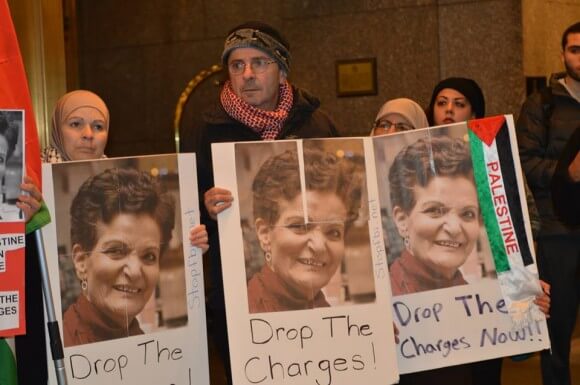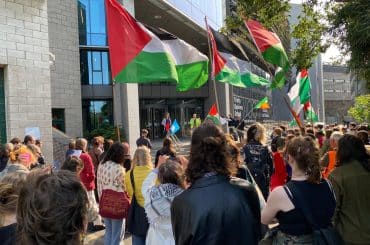The following statement was issued by the Rasmea Defense Committee:
In a travesty of justice, Rasmea Odeh today was found guilty of one count of Unlawful Procurement of Naturalization. For over a year, Rasmea, her supporters, and her legal team have been battling this unjust government prosecution, saying from the start that the immigration charge was nothing but a pretext to attack this icon of the Palestine liberation movement. And although there is real anger and disappointment in the jury’s verdict, it was known as early as October 27th that she would not get a full and fair trial.
On that day, Judge Gershwin Drain made a number of rulings that made her defense virtually impossible. The government’s indictment stated that she had unlawfully gained U.S. citizenship because she had allegedly answered a number of questions falsely on her visa application in 1995 and her naturalization application in 2004. She had been in this country as a lawful permanent resident for almost 20 years, and a citizen for over nine, when she was arrested on October 22nd, 2013.

The main basis for the arrest a year ago was that she had allegedly falsely answered “No” to a question asking whether she had ever been arrested or imprisoned. The government claimed that she failed to disclose that she had been convicted by the Israelis of participating in bombings in 1969. This conviction in a military court was the result of a false confession made after she was viciously tortured and raped by Israeli military authorities for weeks. There is no due process in Israeli military courts, which “convict” over 99% of Palestinians who come before them, and “evidence” from these should not be accepted in a court in the U.S.
But Judge Drain did allow the conviction in Israel to be entered into evidence; and even though he suggested that Rasmea’s assertion that she faced torture and sexual abuse at the hands of her Israeli captors was “credible,” he still ruled that it could not be brought up in the course of her trial. So her attorneys had to scrap plans to call to the stand an expert witness, clinical psychologist Dr. Mary Fabri, who has decades of experience working with torture survivors, to testify that the allegedly false answers on the immigration forms were the result of Rasmea’s chronic Post-Traumatic Stress Disorder (PTSD).
The judge also rejected Rasmea’s selective prosecution motion, even though it was clear that the case against her grew out of the investigation of 23 anti-war and Palestinian community organizers in Chicago and Minneapolis, who were subpoenaed to a federal grand jury in 2010. Make no mistake. Rasmea came under attack by the U.S. government because she is Palestinian, and because for decades, she has organized for Palestinian liberation and self-determination, the Right of Return, and an end to U.S. funding of Israeli occupation. Palestine support work, especially the Boycott Divestment Sanctions (BDS) movement, has made a number of recent gains, and the long arm of federal law enforcement has attempted to crack down on it, like it has on all effective and impactful movements for social justice in the history of this country. The crackdown reached Rasmea.
More than 200 people from across the Midwest, especially from Chicago, traveled to stand with her throughout the trial. They bore silent witness to her incredible testimony, for despite the judge’s rulings, she and her defense team did put the crimes of Israel on record. Her story of being exiled from the village of her birth, Lifta, in 1948; of being exiled again during the 1967 war; of experiencing the death of her sister after the raid on her home in 1969; and of being a political prisoner, one of the most famous in the history of the Palestine liberation movement—all these are stories of the crimes of apartheid Israel, crimes that continue today in the racist settler and military assaults we have seen in the Gaza Strip, Jerusalem, 1948 Palestine, and the West Bank. Israel’s terrorism, and the U.S. government’s complicity, were exposed for all the world to see.
Rasmea’s honesty in the face of cross-examination from Assistant U.S. Attorney Jonathan Tukel was thoroughly convincing as well. She said clearly that she thought the questions on the immigration forms were being asked about her time in the U.S., because she said she had nothing to hide and did not need to lie. She had testified about her torture at the United Nations when she was released in 1979, and as her lead attorney, Michael Deutsch, said, “It was well known that she was convicted, and traded [in a prisoner exchange]. The U.S. Embassy knew it, the State Department knew it, and Immigration should have known it.” So although the government had to prove that she “knowingly lied,” it never met that burden, regardless of what the verdict says.
For over a year, the Rasmea Defense Committee has been organizing educational events, rallies, protests, and call-in days to demand that U.S. Attorney Barbara McQuade and Tukel drop the charges against her. We now have more work ahead of us. Rasmea’s brilliant legal team—Deutsch, Jim Fennerty, Bill Goodman, and Dennis Cunningham—will undoubtedly file an appeal, and have strong grounds to do so, based on Judge Drain’s unjust decisions. And we will continue to support their work with our political organizing and mobilizations.
Just like our people in Palestine and across the world will never rest until every inch of historical Palestine is free, we will never rest in our defense and support of Rasmea as she moves forward to challenge this conviction. As Deutsch said in his closing statement to the jury, “It has been one of the great privileges of my long legal career to represent this extraordinary woman of great passion and dignity.” Rasmea’s story is the story of millions of Palestinians, and of millions of freedom-loving defenders of justice everywhere. Her eventual victory will be a victory for Palestine and for all the people’s movements across the world.
Today, we thank everyone who stood with Rasmea this past year, and ask you to continue fighting with us until we achieve that victory.



A) Sad, so very sad, that a jury did this. I actually had hopes. I hope there are legal avenues left.
B) How in the f*k do long-time, open, and unrepentant terrorists like Rahm Emanuel’s father get allowed in and granted citizenship, and Odeh gets a show-trial and the boot?
C) In the muddle that is Palestinian statehood, there may be at least one small, unambiguous bright spot: that Palestinian courts could start convicting Israelis of crimes such that they would have to declare that conviction just as Odeh did. If the Palestinians actually use evidence and disavow torture, the more the better.
It would be interesting to see if US law is vaguely enough written to mean any conviction rather than convictions in states with which the US has bilateral relations. Heck, Abbas could make recognition of Palestinian court decisions a condition for starting the next round of “negotiations.”
Rasmea did not present a cogent defense. They threw everything against the wall and hoped something would stick. Nothing did.
1) She was tortured and was suffering from PTSD while she filled out the application, which caused her to lie.
2) She didn’t speak English and didn’t get the question.
3) The conviction was false so she shouldn’t have had to answer yes.
Which is it??
Judge Drain is true to his name, and the jury was/is stupid.
total injustice.
So unfair that this long-suffering woman is going back to prison again for the crime of being Palestinian. Zionism is never satisfied–she was hounded out of her land, accused, tortured and imprisoned, exiled, and then hunted down and imprisoned again.
She has a very compelling story. I wish her case could become more widely known.
Rasmea is one of the few Palestinians in the news actually born in Palestine and probably the reason why she has been targeted. She, like mostly all other people of the Odeh family was born in Lifta, the only Palestinian village out of 500 that’s still left standing; all the others having been razed to the ground with either highways cutting through them or new Israeli communities built over their ruins. Of the village’s original 400 houses, there are about 60 still left standing and almost intact as a reminder of the 3000 Palestinians chased off the land by the Zionists in January 1948. It’s also a constant reminder of the Palestinians’ RoR. 3 years ago, Palestinian and Israeli activists succeeded in getting the Israeli court to block the building of upscale homes on the village’s territory that would have demolished the remaining houses. Lifta is a thorn in Israel’s side and it’s only a matter of time before Israel destroys it. Rasmea is also a reminder of Lifta and the RoR.
As to Judge Drain, he replaced Judge Paul Borman, on Rasmea’s case who according to Wiki, ” recused himself after he learned that his family had held investments in the Jerusalem supermarket that Odeh and others were convicted of bombing in 1969, stating that his financial ties “could be perceived as establishing a reasonably objective inference of a lack of impartiality in the context of the issues presented in this case.”
He had refused an earlier request by Odeh’s lawyers to step down from the case on the basis of his long history of involvement with the Jewish Federation of Metropolitan Detroit, that he had raised more that $3 million for a pro-Israeli charity, and had made numeorus trips to Israel, saying that Odeh’s lawyers were engaged in “careless and rank speculation” for suggesting that he could not be impartial in the case.”
Makes you wonder how close Judge Drain is to Judge Borman.